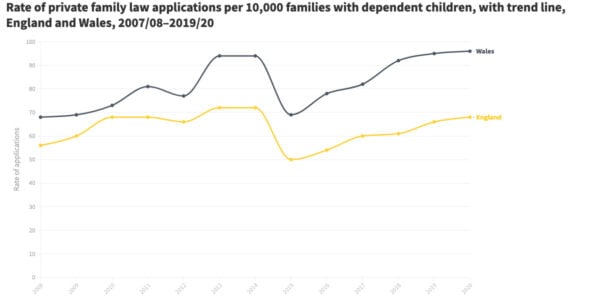Separated parents in England who depend on the family courts to resolve private disputes over child arrangements are likely to live in the country’s most deprived areas, according to a new research report.
The study also reveals a clear north-south divide in the number of private law applications being made, with rates being consistently highest in the North East, North West and Yorkshire and Humber regions, and consistently lowest in London and the South East.
When parents who have separated cannot agree on issues such as where their child or children should live, or who they should have contact with, they can apply for a court order to settle the dispute through a family court.
While the overall rate of families going to court in England is low – less than three-quarters of one per cent of all families made a private law application in 2019/20 – they affect many more children than public law cases, where a local authority intervenes to protect a child at risk of harm. More than twice as many private law applications are started in England and Wales each year than public law ones (54,930 compared to 18,393 in 2019, respectively).
Published by Nuffield Family Justice Observatory (Nuffield FJO), the Uncovering private family law: Who’s coming to court in England? study shows that private law children cases in England disproportionally involve people living in deprived areas. In 2019/20, 30 per cent of applicants lived in the most deprived quintile (by definition representing 20 per cent of the wider population). Just 13 per cent lived in areas in the least deprived quintile.
The report also reveals that parents’ need for support and assistance from the family courts varies by region. In 2019/20, private law application rates in the northern regions ranged between 79 and 81 per 10,000 families with dependent children, but were just 44 per 10,000 in London and 59 per 10,000 in the South East.
Produced by the Family Justice Data Partnership, a collaboration between Lancaster University and Swansea University, Uncovering private family law: Who’s coming to court in England? also uncovered that while most private law applications in England are for child arrangement orders (CAOs) – to resolve where a child should live and who they should see – these have declined as a proportion of all applications from two-thirds (69 per cent) in 2010/11 to just over half (52 per cent) in 2019/20. There has been a proportionate increase in applications for enforcement orders (to enforce a CAO), prohibited steps (to forbid a particular action, such as taking a child abroad without permission) and specific issue orders (to resolve questions such as which school children should attend, or matters related to their religion or health). This potentially indicates an increase in more challenging or contentious cases.
Lisa Harker, director of Nuffield FJO, said:
“Parental disputes taking place within the family courts are sometimes perceived and portrayed as fairly trivial arguments that could perhaps be settled out of court. However, these findings suggest that families who come before the court are likely to have unmet needs, related to levels of deprivation and where they live.
“It is widely recognised that cases brought to court by local authorities disproportionately involve families from more deprived areas, and this study firmly establishes a similar link in cases triggered by parents who have separated. With tens of thousands of children being involved in these cases every year – some of whom will be particularly vulnerable – it is vital that we recognise that deprivation is a factor and begin to consider how to reduce the pressures on families in order to decrease the risk of family conflict.”
Dr Linda Cusworth from the Centre for Child and Family Justice Research at Lancaster University, lead author of the report, said:
“Although overall use of the court remains low, there has been a modest upward trend in the number of private family law applications in England. This indicates a sustained and increasing need for support and assistance – mirroring findings from our previous study of private law children cases in Wales.
“We have developed a demographic and socio-economic profile of families involved in private law children applications in England. Understanding who uses the family courts, and what they might need and want, will provide a more balanced and effective approach to policy and practice development and can avoid mistaken assumptions. It may also result in more carefully targeted interventions, both within and outside the court.”
Uncovering private family law: Who’s coming to court in England? covered applications to the family courts between 2007 and 2020. It is based on population-level data collected routinely by Cafcass (the organisation that represents children’s best interests in family justice proceedings in England) and available within the Secure Anonymised Information Linkage (SAIL) Databank, hosted by Swansea University, linked to demographic data.







